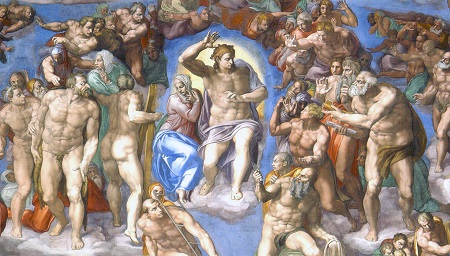Does God have regrets?
Does he ever change his mind? Has he ever wished he had not done something? Has he ever had to improvise something on the fly?
Has he ever needed a good friend to talk him out of a bad idea when something didn’t go right?
Most Christians today and throughout most of the history of the church would automatically scoff and knowingly shake their heads. “No, of course not! God knows everything! He doesn’t make stupid mistakes like we do.”
That trusting attitude comes not really from faith in God, but rather straight out of Greek philosophy, and mainly from Plato’s school. Funnily enough, they thought of themselves as Realists, which has nothing to do with what we call “realistic” but rather the opposite. They believed that the ideal, mental world was the real one, a sublime realm where the ideal forms of everything existed and this world of mud, blood, and tears just the corrupt reflection of it. Therefore their idea of the transcendent God was not like the messy, emotional, sexual, and quite human gods like Zeus and Pan, but simple, pure and unchanging.
But that’s not how God was portrayed in the Bible.
In the big book, God is always getting surprised, always having to change his plans. He not only needs Plan B, but sometimes Plan C and Plan D as well.
And it’s that way from the very start. As soon as he created Adam, he tells him, ‘You may freely eat of every tree of the garden; but of the tree of the knowledge of good and evil you shall not eat, for in the day that you eat of it you shall die.’ [Gen 2:16-17]
Sounds pretty definite. Of course, Adam and the missus immediately test it out. But God does not kill them on the spot. Instead, he curses them, clothes them, and boots them out of Paradise. He says to himselves,‘See, the man has become like one of us, knowing good and evil; and now, he might reach out his hand and take also from the tree of life, and eat, and live for ever’. [Gen 3:22] He prevents Adam and Eve from becoming gods, but one has to take a much broader interpretation of “the day” — 930 years, in fact, Adam’s entire lifespan — to make his threat of death good.
A while later, Cain murders his brother, but then talks God into preventing anyone from taking vengeance on him, though God says the ground itself curses him so he cannot be a farmer. [Gen. 4:15]
God’s biggest change of plans was the Flood, when he decided the experiment wasn’t working because fallen angels had corrupted the human gene pool. The “crop” was contaminated, and so had to cleaned out in order to start again. Being a successful farmer, after all, requires a certain ruthlessness.
The Lord was sorry that he had made humankind on the earth, and it grieved him to his heart. So the Lord said, ‘I will blot out from the earth the human beings I have created—people together with animals and creeping things and birds of the air, for I am sorry that I have made them.’ [Gen 6:6-7]
To reassure those he had saved that he won’t go about destroying everything by water again, he created the rainbow. [Gen. 9:8-17] But soon, the uppity humans started working on the Tower of Babel. This is often thought of as arrogant, vainglorious attempt to reach heaven, but it could have been intended as a refuge from another deluge. Who knows? Either way, God again reacted out of what again seems to be fear:
And the Lord said, ‘Look, they are one people, and they have all one language; and this is only the beginning of what they will do; nothing that they propose to do will now be impossible for them. Come, let us go down, and confuse their language there, so that they will not understand one another’s speech.’ [Gen. 11:6-7]
And on it goes. Abraham, whom God chose to be the forefather of his special people, successfully haggled with him when the Lord dropped by to announce his intention of destroying Sodom and Gomorrah. He got the Lord to promise that if there were as few as ten just people in town, he would not destroy it.
When the angels got to Sodom, and would have been sexually assaulted by the mob, there was no more talk of saving the city, but only Lot’s immediate family. Looks like improvisation in the face of immediate danger to me.
But perhaps the best example of the changeability of God in the Old Testament comes when the people engage in religious naughtiness while Moses is getting the Law. God is really ticked off, and wants to wipe them all out, when they haven’t even heard the Law so they don’t really know what trouble they are in. Moses has to remind him of his many promises:
And the Lord said unto Moses, “I have seen this people, and behold, it is a stiffnecked people.
Now therefore let Me alone, that My wrath may wax hot against them, and that I may consume them; and I will make of thee a great nation.”
And Moses besought the Lord his God and said, “Lord, why doth Thy wrath wax hot against Thy people, whom Thou hast brought forth out of the land of Egypt with great power and with a mighty hand?
Why should the Egyptians speak and say, ‘For mischief did He bring them out, to slay them in the mountains and to consume them from the face of the earth’? Turn from Thy fierce wrath, and repent of this evil against Thy people.
Remember Abraham, Isaac, and Israel, Thy servants to whom Thou sworest by Thine own self and saidst unto them, ‘I will multiply your seed as the stars of heaven, and all this land that I have spoken of will I give unto your seed, and they shall inherit it for ever.’”
And the Lord repented of the evil which He thought to do unto His people. [Ex. 32:9-14]
Thank God for sensible friends like Moses! In fact looking for the word “repent” brings up other occasions where the Lord had regrets:
- When the people groaned in suffering under despoilers during the time of the judges [Judges 2:18]
- For making Saul king who then did not follow the commandments [1 Sam. 15:29]
- For sending a pestilence on Jerusalem after King David ordered a tax-census [2 Sam. 24:16 and 1 Chron. 21: 15]
- The prophet Jeremiah mentions the Lord repenting a dozen times.
- Ezekiel and Jonah mention it 3 times; Hosea, Joel, and Amos 2 times each, and Zechariah once. The prophets had a lot of anxieties about God, it seems.
The Early Fathers, including Origen, brought Greek philosophy in to provide a “worthy” image of God as a rational, compassionate being radiating serene wisdom. They claimed that all of God’s human attributes — everything from the hairs of his beard to the power of his hand to the grief of his heart — were completely symbolic. That God, being a pure spirit, did not in fact, possess any of those physical things. His hand is symbolic of his might, his eyes represent his knowledge of everything and so on.
I think the real reason may be somewhat more complicated. What all the stories of God doing things, feeling things, even repenting things, show is the agency and free will of God. That the Divinity has plans, goals, and the absolute freedom to carry it out. But the trick is that freewill is essential, not just for him, but everyone.
There could be an even trickier reason, however. Origen seriously entertained the idea that God, being utterly holy, does not see sin. Nor, for that matter, sinners.
We say, therefore, with confidence that according to the Scriptures God does not know all men. God does not know sin and God does not know sinners. He is ignorant of those alienated from himself. – [Origen, Hom. on Gen. IV, 6 (Ref. 2 Tim. 2:9, Mt. 7:23, 1 Cor. 14:37-8)]
This is a remarkably intriguing thought. If God cannot even perceive sin, sinful things, or sinners themselves, then that explains a lot. Like maybe why there is such an abyss between the sacred and the profane, the “alienness” of God, why total repentance is necessary, and even a non-Aztec reason for “covering” sins with blood.
It allows God to still know the beginning from the end of things and vice versa… just not all the steps in between. The idea that God may deliberately blind himself to evil opens the door to all kinds of speculation about the nature of sin, grace, and salvation. His own freedom of action gives us our own, for better or worse. Of course, it could all be play-acting on the Deity’s part — how could we tell? But the fact that despite all the pronouncements in the Bible about God’s unchanging nature, that he is the same yesterday, today, and tomorrow, is clearly countered by the text itself, is telling us that things are more complex than we realize.
But this seems to be true: freewill is predestined, but prayer has effects. We should be grateful that God will occasionally appear to be able to be talked out of his anger. Whether or not it is an act or not, whatever works on us to live as better human beings is surely a blessing.

